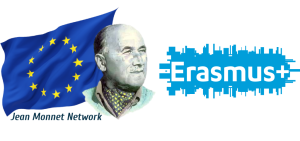
The Jean Monnet Actions in the field of Higher Education supports teaching and research in the field of European Union studies worldwide.
European Union studies refers to the teaching, learning and research about the European Union, its history, aims, structures, functions and/or its policies.
By focussing on the European Union dimension, the Jean Monnet activities should promote active European citizenship and the founding values of the European Union of respect for human dignity, freedom, democracy, equality, the rule of law and respect for human rights, including the rights of persons belonging to minorities (Article 2 of the Treaty on European Union).
In the case of European Union policies, Jean Monnet actions must contribute to spreading knowledge about how these policies can benefit the daily lives of citizens in the EU and/or abroad, and/or how these can influence the policy-making system, in similar fields, either at the Member State level or abroad at a national, regional or global level. A very clear link between the subject of the proposal and the EU policy and/or EU topic that it refers to should be displayed.
The Jean Monnet actions also strive to function as a vector of public diplomacy towards third countries, promoting EU values and enhancing the visibility of what the European Union stands for and what it intends to achieve.
The objectives and criteria to apply for teaching and research are described below.
The Jean Monnet “Teaching and Research” actions will:
- promote excellence in teaching and research in the field of European Union studies worldwide and facilitate career development on EU studies for next generation;
- foster the dialogue between the academic world and society, including local, regional, state and EU level policymaking, civil servants, civil society actors, representatives of the different levels of education and of the media;
- generate knowledge and insights in support of EU policy-making and strengthen the role of the EU within Europe and in a globalised world;
- reach out to a wider public and spread knowledge about the EU to the wider society (beyond academia and specialised audiences) bringing the EU closer to the public;
- strive to function as a vector for public diplomacy towards third countries not associated to the Programme, promoting EU values and enhancing the visibility of what the European Union stands for and what it intends to achieve.
Setting up a project
The Jean Monnet “Teaching and Research” must take one of the following forms: Modules, Chairs, Centres of Excellence.
Modules are short teaching programmes or courses in the field of European Union studies at offered at a higher education institution. Each Module has a minimum duration of 40 teaching hours per academic year for a duration of three years. Modules may concentrate on one particular discipline in European studies or be multidisciplinary in approach and therefore call upon the academic input of several professors and experts. They can also take the form of short specialised or summer programmes.
Chairs are teaching posts with a specialisation in European Union studies (as described above) for university professors for a duration of three years. A Jean Monnet Chair is held by only one professor, who provides the minimum of 90 teaching hours per academic year. The Chair may also have a team to support and enhance the activities of the Chair, including the provision of additional teaching hours.
Jean Monnet Centres of Excellence are focal points of competence and knowledge on European Union subjects. They should gather the expertise and competences of high-level experts aiming to at develop synergies between the various disciplines and resources in European studies (as described above) as well as at creating joint transnational activities, they also ensure openness to civil society. Jean Monnet Centres of Excellence have a major role in reaching out to students from faculties not normally dealing with European Union issues as well as to policymakers, civil servants, organised civil society and the general public at large.
Jean Monnet beneficiaries (modules and Chair holders as well as Centre of excellence participants) are requested to organise activities and events that shall ensure openness to policy makers, civil servants, civil society and the general public at large.
Source: https://erasmus-plus.ec.europa.eu/programme-guide/part-b/jean-monnet-actions/higher-education
